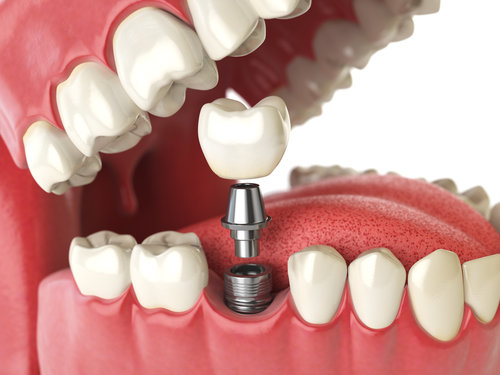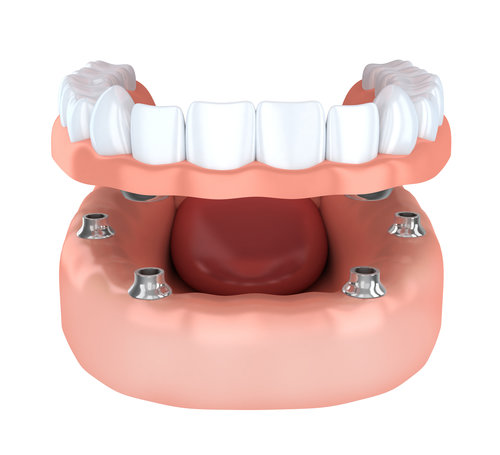What is a single tooth implant?
A single tooth implant is a procedure in which Dr. Ellis would make an incision in the patient’s gums to surgically place an implant where an original damaged tooth was located.
Why would someone need an implant?
- They are missing one or more teeth
- There is damage to a tooth or teeth.
- There is an imminent oral health issue.
Benefits of tooth implants:
- Because implants often replace damaged or unhealthy teeth, replacing these teeth with implants improves overall dental health.
- Replacing damaged or unsightly teeth will improve the cosmetic appearance of a patient leading to increased self-confidence and comfort.
- Replacing missing teeth can improve speech deficiencies and correct improper chewing techniques.
- Tooth implants are much more stable than dentures, which can slip or become dislodged.
- Tooth implants are cost-effective because they are long lasting and a permanent solution to some dental issues.

What is the procedure of installing tooth implants?
Dr. Ellis will perform an initial consultation to decide if you are a candidate for the procedure. This consultation commonly includes reviewing dental records, taking x-rays and taking impressions of your teeth and gums. These x-rays will allow Dr. Ellis to determine if there is enough bone mass to support the implant mechanism. The first step of the procedure will require Dr. Ellis to make a small incision in the gum and install an implant into the jawbone of the patient. During the next 2-6 months, the implant will ‘fuse’ to the jawbone. During this time, we will install a temporary tooth until a permanent tooth can be placed. After the implant has fully fused, Dr. Ellis will install a custom abutment which allows a permanent replacement tooth called a crown to be placed as well.. A few weeks after this procedure, patients will encounter increased confidence in their smile and regain their natural ability to speak and talk.
What is an implant retained denture?
Dentures are a solution for patients who have lost all of their teeth. Traditionally, dentures are unsecured and can be uncomfortable, awkward, or even painful for patients. Implant retained dentures are dentures that are secured to implants attached directly to the jaw bone. Implant retained dentures (sometimes referred to as ‘All on Four’) are often much more comfortable for patients and can improve proper chewing ability and speech issues that are common with traditional dentures.
Benefits of implant retained dentures:
- Missing teeth can have a significant impact on speech ability and normal chewing. Implant retained dentures can replace missing teeth and greatly improve these motions.
- In addition to the mechanical benefits of implant retained dentures, these dentures can also significantly improve a patient’s cosmetic appearance, increasing comfort and self-confidence.
- No longer the need for sticky adhesives or pastes.

What is the procedure of implant retained dentures?
Dr. Ellis would perform an initial consultation to decide if you are a candidate for the procedure. This consultation commonly includes reviewing dental records, taking x-rays, and taking impressions of your teeth and gums. The primary reason for this consultation is to determine the strongest part of the bone structure where the implants can be placed. The impressions of your teeth and gums will be used to make models to create a temporary denture. The next step is to place the implants. Dr. Ellis will cut along the gums where the implants will be placed then he will drill holes into the bone to place the implants. Once the implants are placed, he will stitch the incision and place the temporary denture. This temporary denture will remain until the implants and bone fuse together. For upper jaws, this time can be 5-6 months or more and for lower jaws 3-4 months. After the implants have fused to the bone, we can place the final denture. We will first take x-rays to verify that the implants are securely placed then Dr. Ellis will make a small incision to expose the head of the implant. He will then install caps on the implants to keep the gums away from the top of the implant until healed. This process will take 10-14 days. Once the gums have healed, the healing caps will be replaced with abutments that will attach to the final denture and we will take another impression of your gums and teeth to fabricate the permanent denture. Once the permanent denture has been made, we will temporarily install the permanent denture using wax. If the patient and Dr. Ellis are happy with the look, fit and function of the denture, we will install the denture to the implants using either special nylon retention inserts, custom fabricated titanium denture attachments or a bar attachment.
How Much Does It Cost?
The out-of-pocket cost for dental implants depends on each patient’s exact needs and dental insurance plans, which may help significantly lower your cost. If you’re ready to take the next step to the life you deserve, we at Denver Dental Arts can we work with you to fully understand out-of-pocket costs, insurance coverage, and financing options to help you can help fit a new smile and renewed mouth health into your budget.


